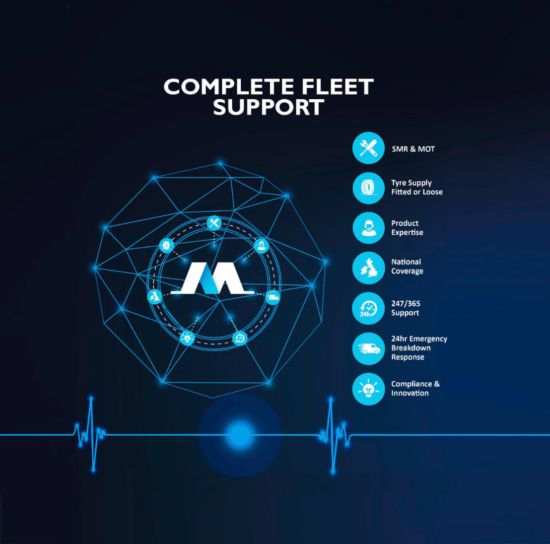One less headache – let MFS keep your fleet on the road
 MFS positions itself as a fully-fledged, flexible tyre fitment solution for fleet businesses across the UK (Image: Micheldever)
MFS positions itself as a fully-fledged, flexible tyre fitment solution for fleet businesses across the UK (Image: Micheldever)
After the doldrums of the “COVID years”, new vehicle sales are slowly recovering. The SMMT reports that the UK new car market clocked up its 20th consecutive month of growth in March, with a 10.4 per cent year-on-year rise in registrations, adding 320,000 new cars – the best March since 2019; whilst 53,000 new light commercial vehicles also joined UK roads in March as more fleet owners upgraded to the latest models than in any other month in the last three years – an increase of 11.1 per cent.
This picture is shared internationally, with the latest European Automobile Manufacturers’ Association (ACEA) figures showing EU car sales grew by 10.1% in February, with France (+13%), Italy (+12.8%), Spain (+9.9%) and Germany (+5.4%).
Within that, it is clear that the fleet sector is driving much of the recovery. According to the SMMT data, the percentage of new vehicles purchased by fleet companies grew by almost 30 per cent.
UK car sales March 2024 (Source: SMMT)
Petrol still No. 1 – but losing share
If we look deeper into these figures, not only is it the fleet sector that is driving this resurgence, there is also a shift in the type of vehicle being registered. The EU stats show that hybrid-electric now has a 29 per cent share of the new car market, battery-electric has maintained a stable market share of 12 per cent, and plug-in hybrids now represent seven per cent of all EU car sales. Whilst petrol cars remain number one, their share is down to just 36 per cent, with diesel sales representing just 13 per cent of the market.
This level of change is having a material impact on fleet owners, especially when it comes to keeping your fleets on the road. To take one example, EV owners are reporting faster tyre wear on their new vehicle than they ever experienced on a previous ICE vehicle, yet those same EV owners claim that when they got behind the wheel of their new vehicle for the first time, they had exactly the same expectations on tyre wear as they had with their previous car, van or truck. As a result – as this report from JD Power reveals – no-one should be surprised to find that EV drivers are becoming increasingly disappointed with what they are finding.
Full, flexible solution
As a fleet owner, this has a material impact on how you manage your fleet. If your drivers are noticing faster wear and tear on their vehicle, you need to ensure that those tyres are being checked regularly, and that you have a tyre provider on hand to manage any that need replacing to keep you on the road.
One such partner is Micheldever Fleet Solutions, or MFS. We spoke with Peter Gittens, who is head of MFS, an operation he introduced as a “fully fledged, flexible tyre fitment solution for fleet businesses across the UK.” Backed by the country’s leading tyre distributer, Micheldever Tyre Services, MFS offers extensive nationwide coverage across the UK for a number of fleet organisations, with a specialist focus on the light commercial vehicle, vehicle hire, logistics, utilities and emergency services sectors. It also has increasing national relationships in the Contract Hire and Leasing market.
“MFS prides itself in building flexible fleet solutions that suit individual customers’ needs, using their product expertise, national coverage and unique relationships with tyre manufacturers and network partners, to build solutions tailored to the requirements of its fleet customers,” states Gittens.
Tailored to customer needs
In such a fast-changing world, it may not surprise to find that MFS is one of the fastest growing players in this market. From simple individual tyre supply to fully integrated and managed fitted solutions – and everything in between – MFS can tailor its solutions to meet the needs of all fleet providers. “Whether your fleet contains bikes, cars, vans, 4×4, HGV, or – increasingly – electric vehicles, MFS can support you with tyres, vehicle servicing, maintenance and MOTs – whatever it is that you need to keep your vehicles on the road, resulting in one less headache for you,” Gittens concludes.


 Triangle Tyres
Triangle Tyres

Comments